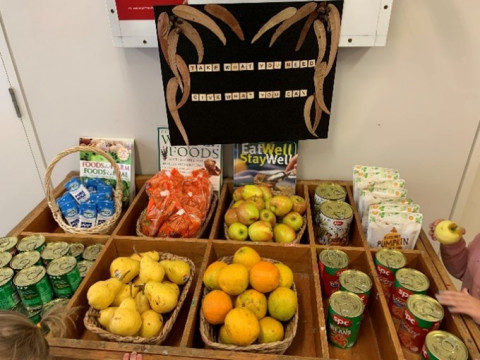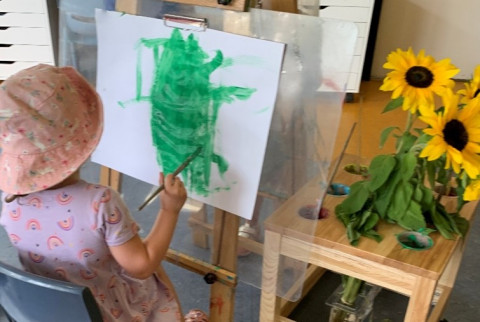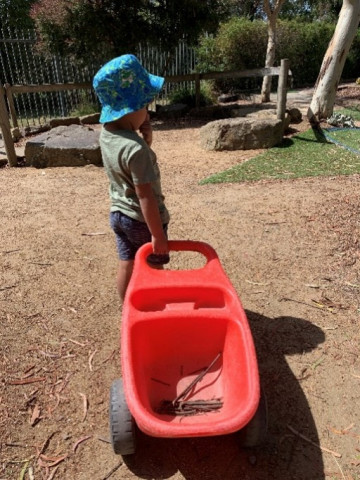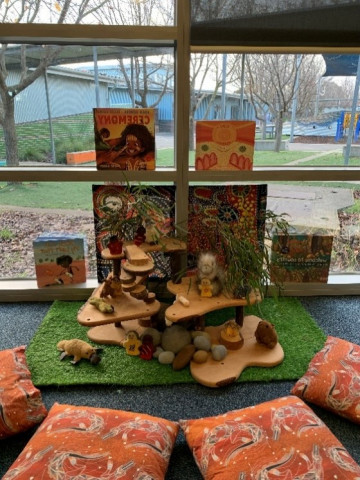Published 28 Feb 2023
Supporting learner wellbeing in early childhood education - Yuille Park Children’s Centre
Engaged with colleagues, school and the broader community
Amandah Taylor – Kindergarten Teacher
Yuille Park Children’s Centre
Schools and early childhood services across Victoria continue to provide quality learning experiences across all levels. The VIT’s Professional Practice team is privileged to see this work first hand on visits to workplaces around the State. Here is just one example spotlighting the great work happening in a Victorian early childhood service.
Amandah Taylor was awarded the Minister’s Award winner at the 2022 Victorian Early Years Awards. We spoke to Amandah about how engaging with colleagues and the broader community to bridge the gap between kindergarten and primary school has improved the wellbeing and educational outcomes of the learners in her kindergarten program.
Q: Can you give some background to the development of your approach to the initiative, including any research or established models / strategies that your approach is based upon?
Yuille Park Children’s Centre is situated on Wadawurrung Country in Wendouree West, Ballarat. The learners attending the kindergarten program are a mix of three- and four-year-olds, some of which are from disadvantaged communities and have experienced trauma in their lives. All the families attending the Centre are loving and caring, who adore their children and want the very best for them.
In 2015, the Centre became part of Yuille Park Community College to bridge the gap between kindergarten and primary school. Teaching staff from both learning environments came together as a holistic team of educators committed to developing strong relationships and providing the appropriate support and best quality education and care for the children and families in the community.
The kindergarten’s philosophy is based upon meeting the needs of our children, families and community. As well as using the Victorian Early Years Learning and Development Framework (VEYLDF) and the Early Years Learning Framework (EYLF), we rely on the works of
- Dr Bruce Perry, who founded the Neurosequential Model of Therapeutics
- Abraham Maslow’s Hierarchy of Needs
- Peter Grey’s work on play and learning
- Dr Sue Atkinson’s The Possum Skin Pedagogy
- we are also inspired by the voices of the Elders to guide our practices with Aboriginal culture.
Q: What structural things are in place to ensure that the initiative has its best chance at success?
Yuille Park Children’s Centre benefits from the professional relationships and generosity from Yuille Park Community College, and principal Brett Shillito’s confidence and trust in our work to support young children and their families. Investment in the early years reaps benefits later in life, and along with the school’s additional funding and School Readiness Funding, the Centre is able to employ additional staff to support our kindergarten programs.
This year, one focus is on meeting the basic needs of families, and supporting access and participation in the kinder program by providing food staples, a lending library and clothing as part of our ‘Take What You Need – Give What You Can’ initiative.

'Take What You Need – Give What You Can' initiative

Calm and relaxed learning environment – a study of sunflowers
With regards to wellbeing, we are able to provide an outdoor/indoor program and a slower pedagogy, where learners have more time outdoors, connected to the land to enjoy what nature has to offer. We will continue to support families through our breakfast program and are planning to develop some community garden beds where families have access to free fresh produce as it becomes available.
With this approach, our educators are constantly challenged and inspired to give more to the learners, who are at the heart of everything we do. Every staff member at the Centre is deeply committed to the service of the families and children of this community.
Q: What are the greatest benefits to staff development of this approach?
As a team, we are constantly learning and developing our skills and knowledge, and we make time each week to critically reflect and discuss any new theory and practice we discover.
Together we attended the Early Childhood Australia (ECA) Reconciliation Symposium in 2019, and as a result, we initiated the development of the Reconciliation Action Plan (RAP) that continues to inform the school and kindergarten collectively. This work also involved the development of an anti-racism policy as part of the RAP requirements. In 2022, I was also invited to speak at a conference about the ways we have embedded Indigenous perspectives into our work at Yuille Park.
Three members of the team are currently undertaking further study. Leanne Attwell and Jodie Dickson, both diploma qualified co-educators, are upgrading their qualifications to a Bachelor in Early Childhood Studies, and I am studying the Neurosequential Model of Therapeutics with the view of linking the VEYLDF with that work in order to develop a Pedagogy of Care and Therapeutics. I hope this work will be used to support other kindergartens with a similar demographic and dynamic.
Q: What have been the benefits to learner outcomes of this approach?
By providing a nurturing place to learn and develop, and delivering education through a Pedagogy of Care, we see the benefits to learners every day. The room is generally calm; the children are relaxed and they have quickly learned to trust us as carers. It is only when children are calm and relaxed they are able to learn at their best. At this early stage of the year, we are already seeing strong friendships being formed and the children are showing an interest in their environment. With additional staff, we are able to follow those interests and support their innate desire to learn.

Slowing down and being in nature

Embedding Indigenous perspectives through literacy and play
Yuille Park Community College principal Brett Shillito believes the work of the kindergarten is having a positive impact on the general wellbeing of students. The education and care experienced by families and children who have attended Yuille Park Children’s Centre continues to set them up for a positive educational journey throughout the rest of their school lives.
The children we first taught in 2015 are now in year 6 and teachers across the college have noticed the flow-on effect the kindergarten is having on the entire school. They can see that the children transitioning from kinder to prep are more emotionally and socially prepared for the nuances of school. There are less behavioural issues across the school, and the children are more able to concentrate and are interested in learning.
Q: Are there any milestones or achievements that staff or learners have experienced as a result?
Yuille Park Children’s Centre has been recognised for its commitment to learner wellbeing recently. The Centre moved from ‘Working Towards’ in 6 out of 7 quality areas to ‘Exceeding’ in all 7 quality areas. In 2022, I received the Minister’s Award for Excellence in Early Childhood Teaching and a Community Service Award from our local MP’s office Catherine King. All the progress we have made and recognition we have gained from supporting our learner’s wellbeing and transition to school belongs to every educator in the Centre.
Do you have an example of outstanding work in your school or early childhood service? We’d like to consider showcasing it the Excellence in Teaching section of our website. Send your example and contact details to vitcomms@vit.vic.edu.au.
